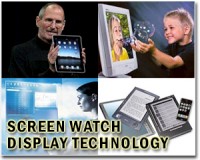 |
Beijing (AFP) Sept 15, 2010 Zhang Li started selling e-readers in Beijing six months ago, hoping to cash in on what she believed would be an inevitable market boom. Now, she's not so sure she made the right call. The immense popularity of versatile tablet computers including Apple's iPad -- which will be officially launched Friday in China -- and the relatively high prices of e-readers have so far kept the sector from blossoming, experts say. "Sales of e-readers just do not compare with those of smartphones or tablet computers," Zhang told AFP at the electronics mall where she runs a sales stall. The dejected saleswoman explains with envy that while she sells about 10 e-readers per month, her competitor at the next booth has shipped three or four grey market iPads -- widely available since the US launch in April -- daily. "A mass market for the e-reader has not been shaped in China," Simon Ye, a Shanghai-based analyst with US technology research firm Gartner, told AFP. "There are too many substitutes with stronger performance for the product." Apple has announced that the cheapest version of the multifunction iPad, the 16-gigabyte model, will cost 3,988 yuan (590 dollars) in China, with the 32GB model selling for 4,788 yuan and the 64GB version for 5,588 yuan. Most e-readers cost between 1,000 and 4,000 yuan, according to traditional and online vendors -- pricing them out of the market for many cost-conscious consumers looking for more functions for their money. "I don't have an e-reader... it is too expensive," Jason Yang, a 40-year-old foreign trade company executive, told AFP as he browsed the electronics market, adding that only a price below 500 yuan would be acceptable. "Other products are more fun and more useful." China-made e-readers using e-ink -- a display technology that creates the appearance of ordinary ink on paper by reflecting ambient light -- were first launched as early as 2006, according to media reports. But sales were negligible until US Internet retail giant Amazon scored a major success with the release of its Kindle device in 2007, piquing consumer interest. Despite competition from tablet computers, expectations for improved sales are high after around 700,000 e-readers were sold in the country last year, with Chinese consultancy Zero2IPO forecasting that 1.2 million units could be shifted this year. Now more than 40 Chinese producers have entered or plan to jump into the market, betting on users' growing awareness of the device. Many foreign brands, including Japan's Sony Reader, are keen to officially sell their devices in China, the world's most populous nation with 1.3 billion people, though their products are already available on the grey market. Vendors have poured millions of dollars into advertising. Hanvon, China's largest e-reader maker, pulled off a marketing coup in 2008 by sending its device into space on China's Shenzhou-7 mission. Savvy public relations have failed to convince sceptical buyers, however. "I do not need one. I use my computer," said David Wu, 25, a power plant employee who has an iPhone. "My parents bought one when they first came out because they were curious. They used it for a little while but never use it now." Analysts say that beyond the question of functionality, Chinese buyers have been hesitant to invest in e-readers as traditional books remain inexpensive and because they do not associate high-tech gadgets with serious reading. A shortage of content is also clouding the market's growth potential, as publishers have expressed concerns about rampant piracy and are unsatisfied with the portion of profits that device manufacturers would share with them. Some content providers have responded by developing their own e-reader brands, while device makers have started building their own online book stores. Hanvon -- also known as Hanwang -- is aiming to offer 200,000 authorised digital titles on its online platform by year's end, after agreeing to give 80 percent of download revenues to content providers. Company chairman Liu Yingjian has also said communication functions would be added to its e-readers as part of a drive to increase the products' "fun-added value", according to media reports. Zhang Yanan, a Beijing-based analyst with Zero2IPO, said she expected e-readers to have even more features in the future as producers look to address their relative disadvantages. "A new terminal market may emerge as e-readers, tablet computers and other products are likely to integrate in the future," she said.
Share This Article With Planet Earth
Related Links Space Technology News - Applications and Research
 Indian handset makers emerge as hyper-competitive force
Indian handset makers emerge as hyper-competitive forceNew Delhi (AFP) Sept 15, 2010 During this year's IPL cricket tournament in India, mobile phone manufacturers used the hugely popular extravaganza to blitz viewers with an array of sponsorship deals and advertising. But rather than seeing the familiar big international brands, cricket fans were bombarded by nimble home-grown handset makers who saw the opportunity to reach consumers nationwide, particularly in rural areas. ... read more |
|
| The content herein, unless otherwise known to be public domain, are Copyright 1995-2010 - SpaceDaily. AFP and UPI Wire Stories are copyright Agence France-Presse and United Press International. ESA Portal Reports are copyright European Space Agency. All NASA sourced material is public domain. Additional copyrights may apply in whole or part to other bona fide parties. Advertising does not imply endorsement,agreement or approval of any opinions, statements or information provided by SpaceDaily on any Web page published or hosted by SpaceDaily. Privacy Statement |